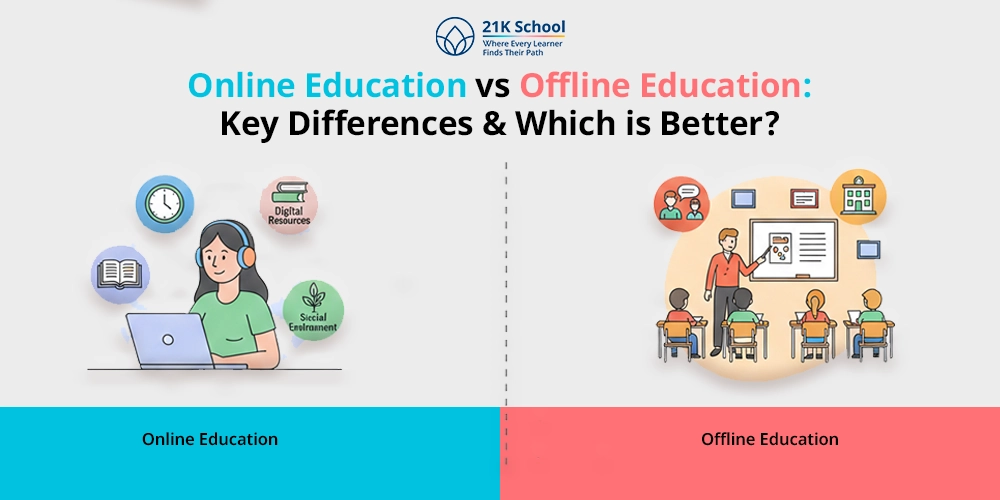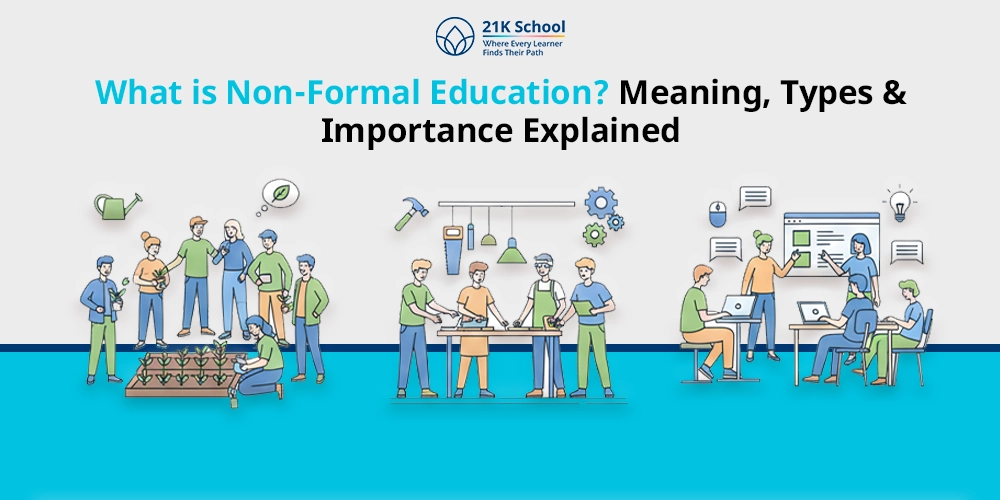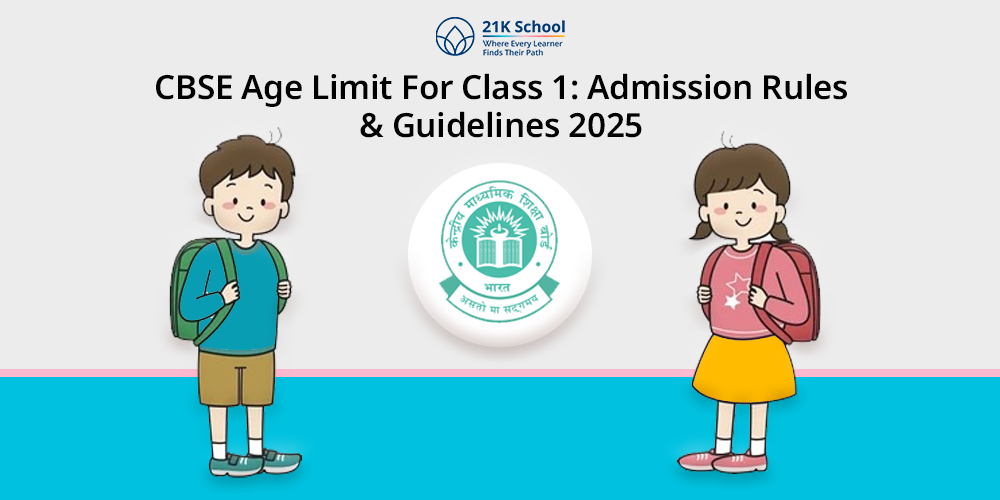
Children reaching school going age, have this excitement of attending formal education. And it is usually filled with a number of questions. “Is my child old enough to study in Class 1 as per CBSE?” is one of the most frequently asked questions by parents.
Not just that, these policies appear as different for each board and each state. And that’s why, you are not alone in case you are confused.
This paper will start clearing the mist to give us an elaborate explanation of the age criteria of CBSE regarding Class 1. Basically, for admission 2026-27, and what it implies to your child.
Table of Contents
- What is the Age Limit for CBSE Class 1?
- CBSE Age Limit For Class 1- Comprehending Official Age Guidelines
- CBSE Age Limit For Class 1- Variation and Policy Changes
- CBSE Age Limit For Class 1- Which Documents to Provide
- CBSE Age Limit For Class 1- Flexibility and Exceptions
- How CBSE practices in relation to Other Education Boards?
- Parental Concerns and Solutions for CBSE Age Limit For Class 1
- CBSE Age Limit For Class 1- Government schools Vs Private schools Policies
- CBSE Age Limit For Class 1- Timeline and Stepwise Process
- Conclusion: Experts Advice for Parents
What is the Age Limit for CBSE Class 1?
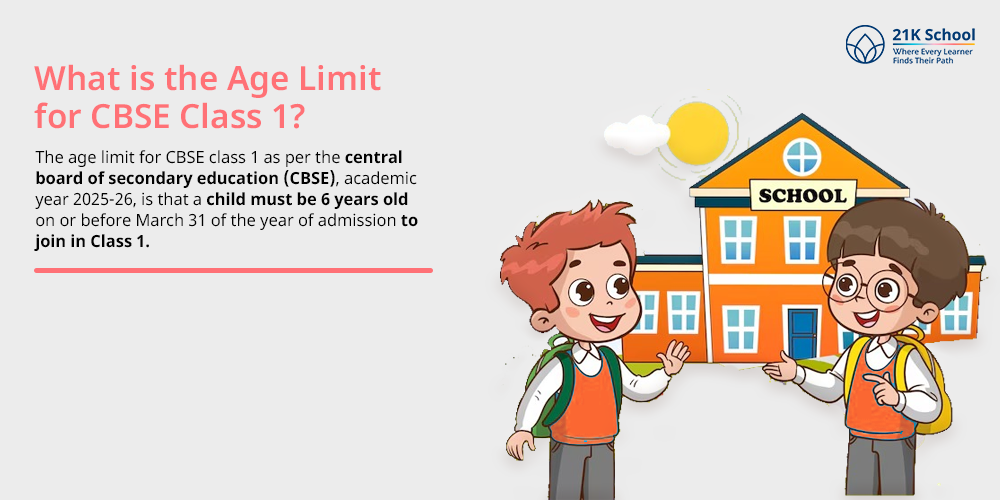
The age limit for CBSE class 1 as per the central board of secondary education (CBSE), academic year 2026-27, is that a child must be 6 years old on or before March 31 of the year of admission to join in Class 1.
CBSE Age Limit For Class 1- Comprehending Official Age Guidelines
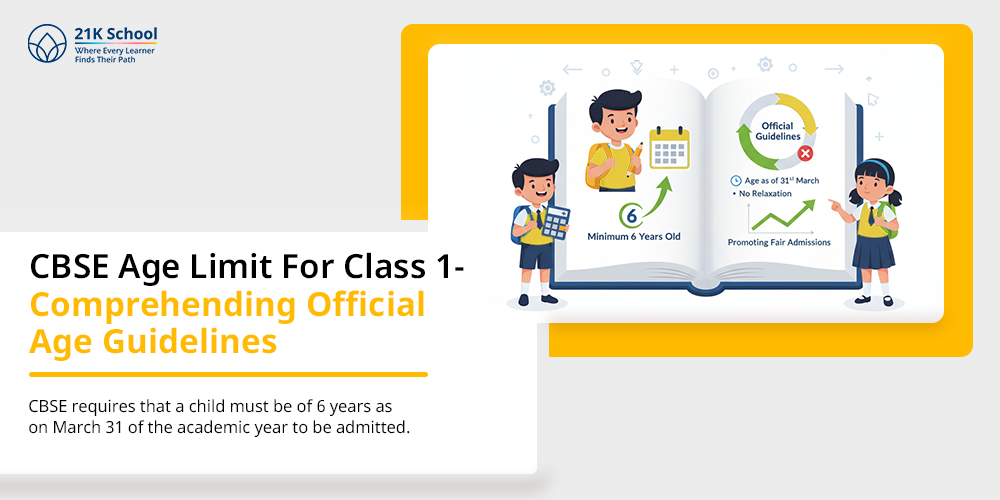
CBSE requires that a child must be of 6 years as on March 31 of the academic year to be admitted. As an example, when a child wants to be enrolled in Class 1 in April, 2025 (2025-26 session). So in such a case the child has to be born on or before March 31, 2019.
CBSE affiliated schools adhere to this cut-off date. There is no agreed maximum age limit. Although usually it is to age 7 with only a few special cases available.
This shift was greatly impacted by the NEP 2020 proposed. Here the earlier version of 10+2 was changed to a 5+3+3+4 model.
This system suggests that there should be 3 years of preschooler education and 2 years of foundational-level education (nursery and kindergarten). Finally being followed by formal schooling starting at age 6.
Still, few parents are confused between differing primary educational levels. Read more on preschool vs kindergarten to stay carefree.
CBSE Age Limit For Class 1- Variation and Policy Changes
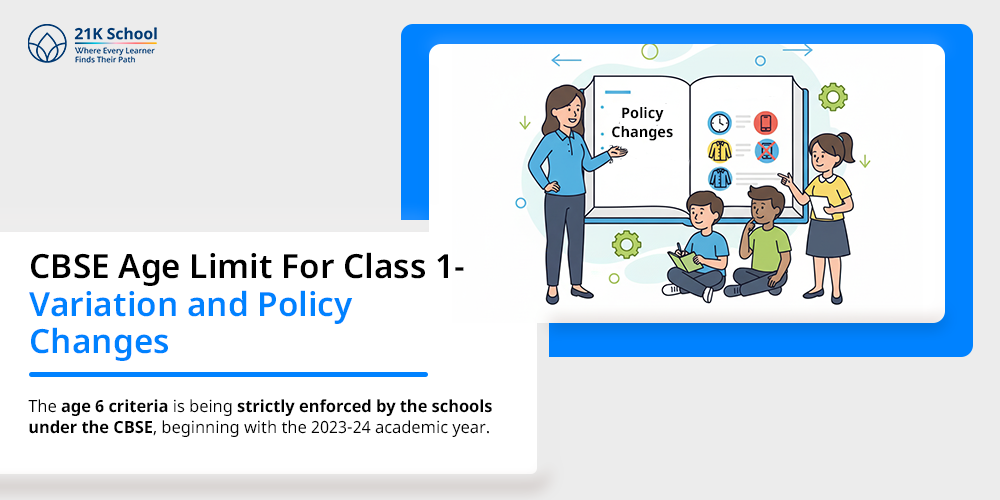
Before National Educational Policy (NEP) was formulated, many states and schools practiced the idea of admitting children as young as 5 into Class 1. The age 6 criteria is being strictly enforced by the schools under the CBSE, beginning with the 2023-24 academic year.
For example, in Karnataka, there was some flexibility to permit admission of children aged 6 by June 1 by the state government. But, CBSE and ICSE schools resisted, retaining the March 31 cut off date.
Before moving ahead, refer to the process of shifting from CBSE to ICSE.
In the same line, CBSE schools in Kerala stuck with their resolutions. That too to the extent of parents actually signing affidavits as a recognition of the revised age policy.
Most CBSE schools implement a nationally similar policy. But a few variations can remain at the state/private level.
A school may interpret the CBSE guideline in a different way, so it is always best to verify against the school.
CBSE Age Limit For Class 1- Which Documents to Provide
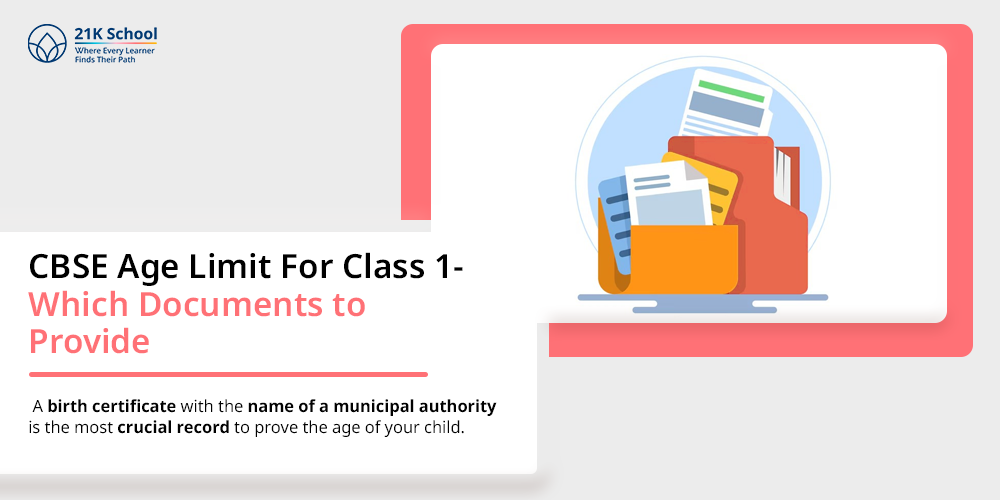
There can be many accepted forms of documentation that represent one’s age accurately. A birth certificate with the name of a municipal authority is the most crucial record to prove the age of your child. Others would be:
- The date of birth of a child is contained in a passport.
- Aadhaar card
- Birth date on hospital or medical records
- A legal affidavit, signed and notarized, confirming the child’s age
In the process of admission, the parents are often asked to bring both originals and copies of the documents. Preference is also given to attested copies when any other documents such as affidavits are to be used.
CBSE Age Limit For Class 1- Flexibility and Exceptions
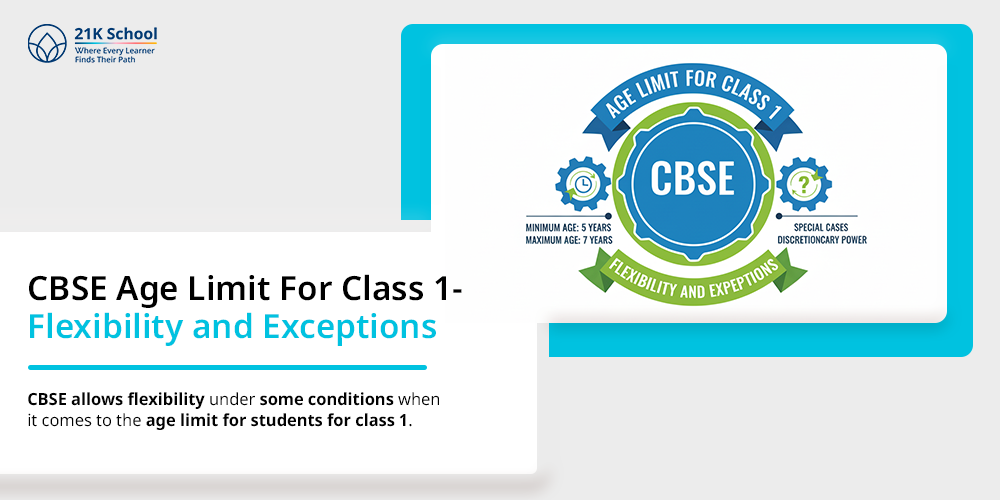
CBSE allows flexibility under some conditions when it comes to the age limit for students for class 1. The exceptions are for mid-year transfer or relocation, particularly between board and nation. In such cases, CBSE schools can decide on a case by case basis.
However, the schools must provide transfer certificates and certified academic records of the former school. For the education of children with special needs, they can receive extended age limits, generally having two years of relaxation.
Such exceptions should be documented and must be permitted either by the school principal or authorities in question.
International students or Non-Resident Indian (NRI) children need their documents abroad to be translated to English language and authenticated. They usually need equivalency certificates signed by education departments of their own country.
How CBSE practices in relation to Other Education Boards?
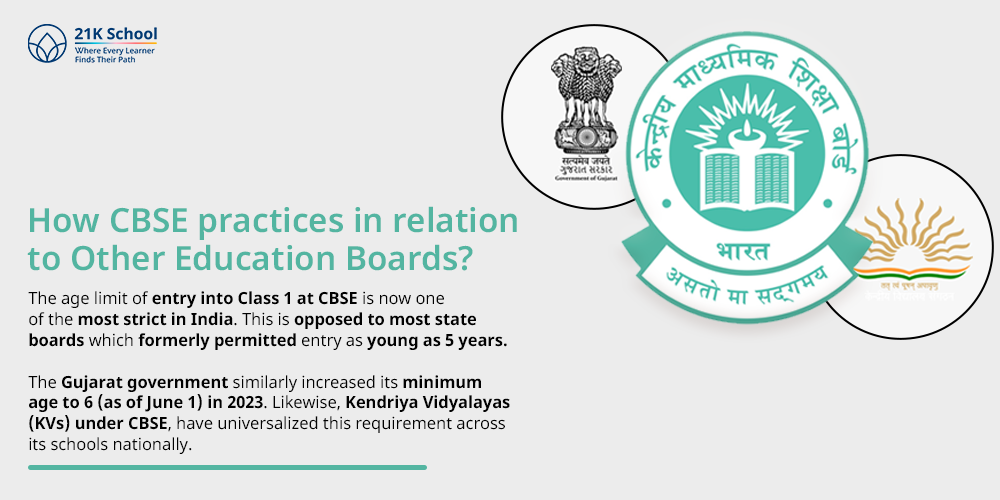
The age limit of entry into Class 1 at CBSE is now one of the most strict in India. This is opposed to most state boards which formerly permitted entry as young as 5 years.
As another example, the Gujarat government similarly increased its minimum age to 6 (as of June 1) in 2023. Likewise, Kendriya Vidyalayas (KVs) under CBSE, have universalized this requirement across its schools nationally.
The schools can even issue their own tests to see if a child fits into Class 1. This is regardless of their age being marginally below the CBSE cut-off.
This flexibility might give problems to students besides the benefits of switching boards from state board to CBSE. Age compatibility should be established by parents before they lead on such transfers.
Because once there is an age mismatch, it may lead to re-admission to a lower grade of their child.
Parental Concerns and Solutions for CBSE Age Limit For Class 1
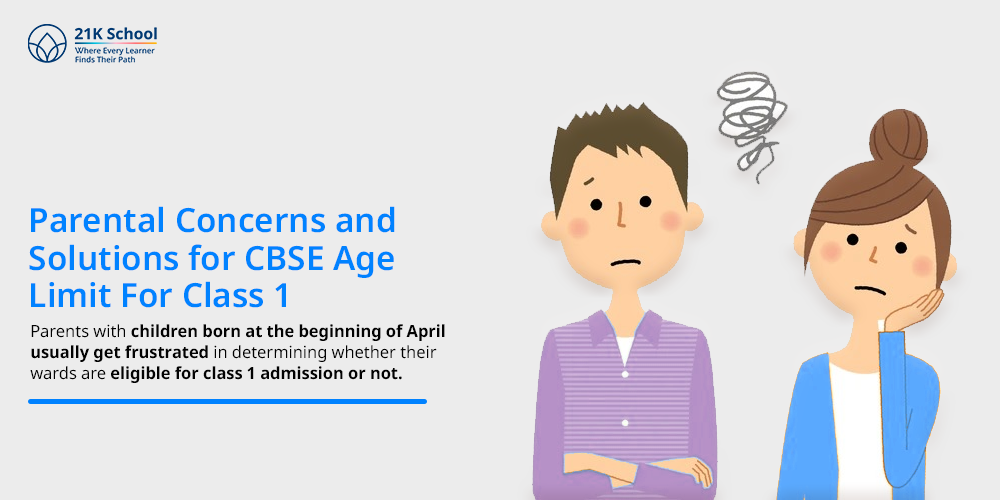
Parents with children born at the beginning of April usually get frustrated in determining whether their wards are eligible for class 1 admission or not.
Some private schools might provide bridge courses in these situations, e.g., extended kindergarten or a preparatory year. Others may admit conditional or carry out tests to check readiness.
There is even the option of submitting hospital records, Aadhaar or taking affidavits. Parents who lack a birth certificate or have delayed documentation can opt for these options. But this way they would face greater inspection and longer verification time.
Another problem is children born abroad. The parents must make sure that they have official, translated versions of foreign birth certificates of their children. They also might have to seek equivalency certificates at the local education authorities.
CBSE Age Limit For Class 1- Government schools Vs Private schools Policies
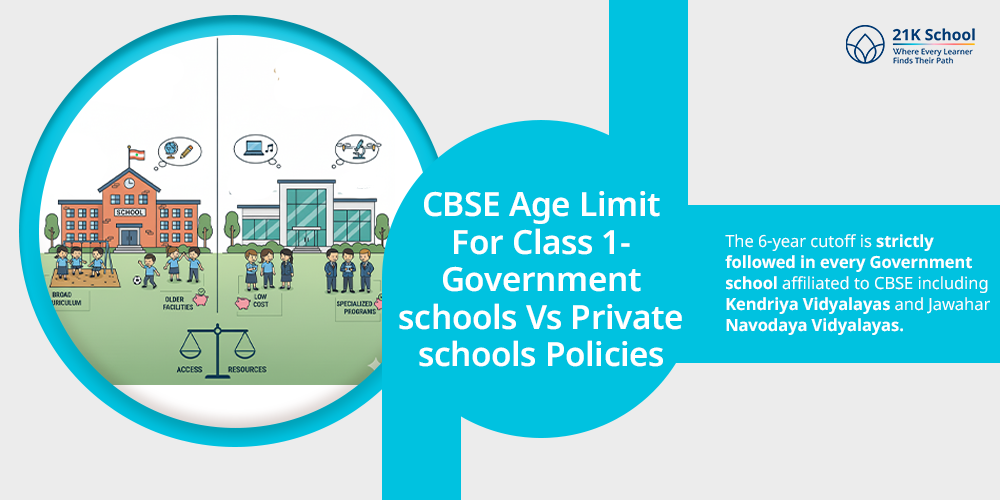
The 6-year cutoff is strictly followed in every Government school affiliated to CBSE including Kendriya Vidyalayas and Jawahar Navodaya Vidyalayas. These schools have central guidelines, and are less apt to make exceptions.
Conversely, the private CBSE affiliated schools can have a little bit of freedom as far as admission is concerned. Especially in special cases where there is an international transfer or a learning disability among children.
Saying that, even privately owned institutions have to follow the key policies of the CBSE. Particularly when subject to board inspection or accreditation renewal.
A parent should always take the time to have clarity on the school age cutoff policy, so that the child’s right to admission isn’t violated. They should also have all the documentation required at the time of the admission.
CBSE Age Limit For Class 1- Timeline and Stepwise Process
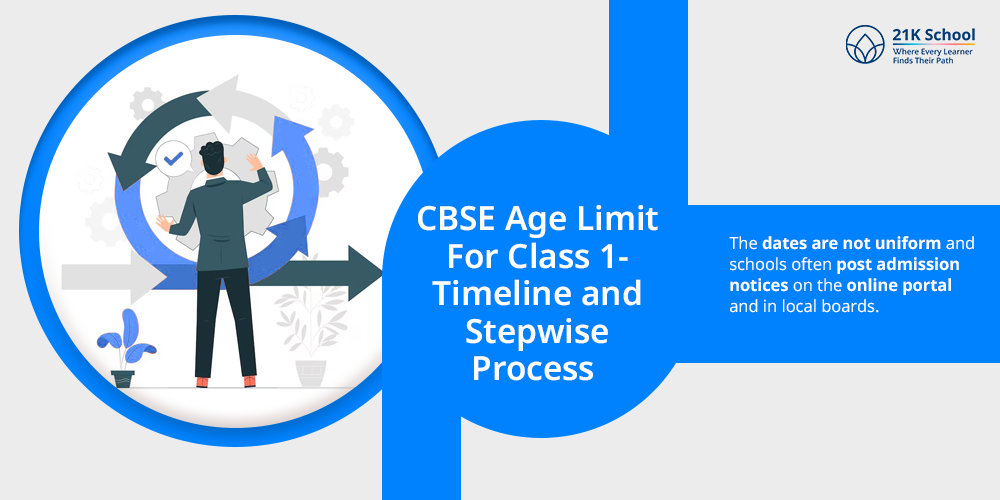
The dates are not uniform and schools often post admission notices on the online portal and in local boards. The admissions in most of the CBSE schools start in November through February of the next academic year.
The normal procedures involve:
- Age eligible: To check just use your child’s date of birth and determine whether he/she will be 6 years old by March 31.
- Pre-documentation: Prepare attested and legitimate copies that will be needed of all the essential proofs.
- Application: Download the application form, or come in person to fill out the one available offline.
- Interview or assessment: Other schools can do informal assessment, or interviews with parents to confirm eligibility.
- Confirmation of admission: The candidates who have been successful receive letters of admission or enrollment confirmation mails.
Be sure to mark deadlines, particularly while document submission. It is not good to miss a deadline. Even after having an extension of a few days, it may cause your application to be pushed to the following academic year.
Conclusion: Experts Advice for Parents
According to education consultants, parents should start planning one year before they would want their child to join Class 1.
This will give time to clear document problems, going through open houses, and knowing admission requirements in different schools.
A minimum period of 6-years is advocated by child psychologists for moving to class 1. It is so that they are able to do better after reaching the proper age of development.
Following these criteria children ace in the fields of attention span, emotional maturity, and interaction with peers when formal schooling starts.


